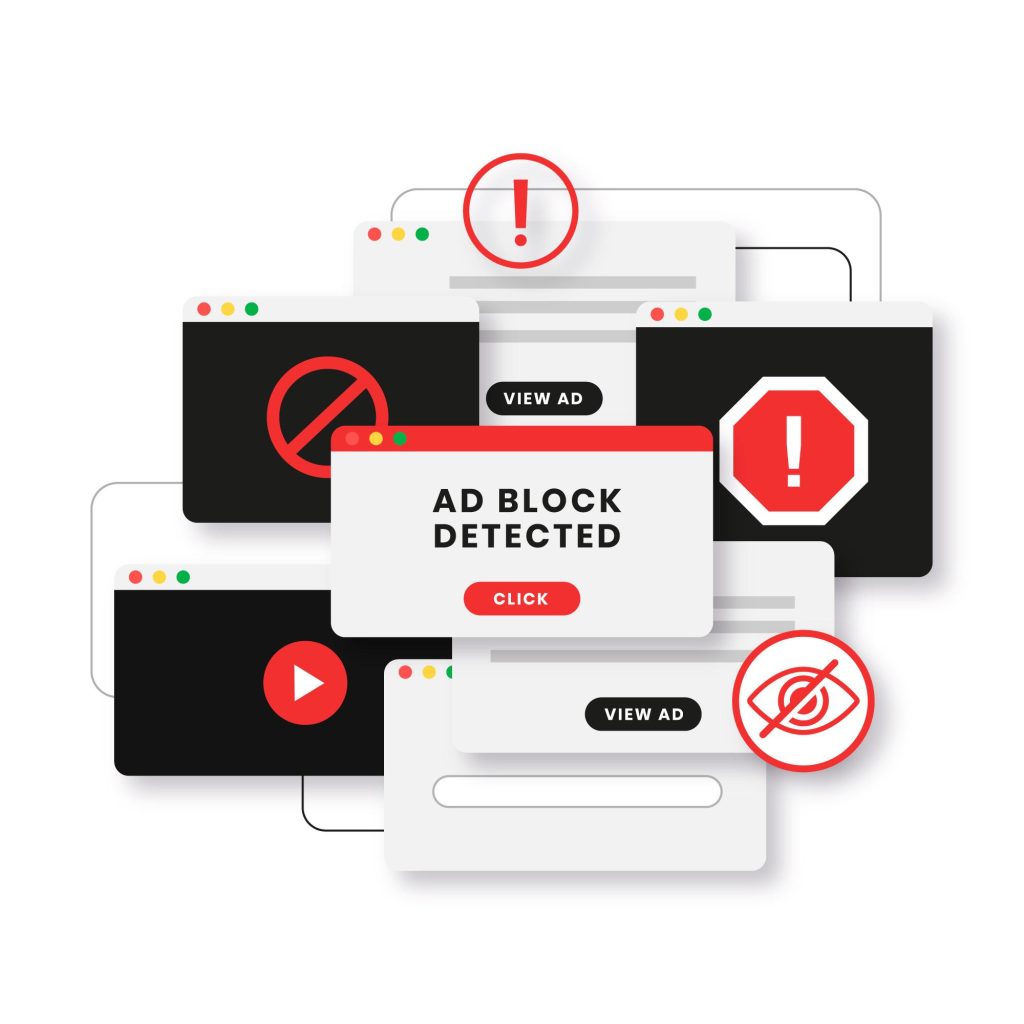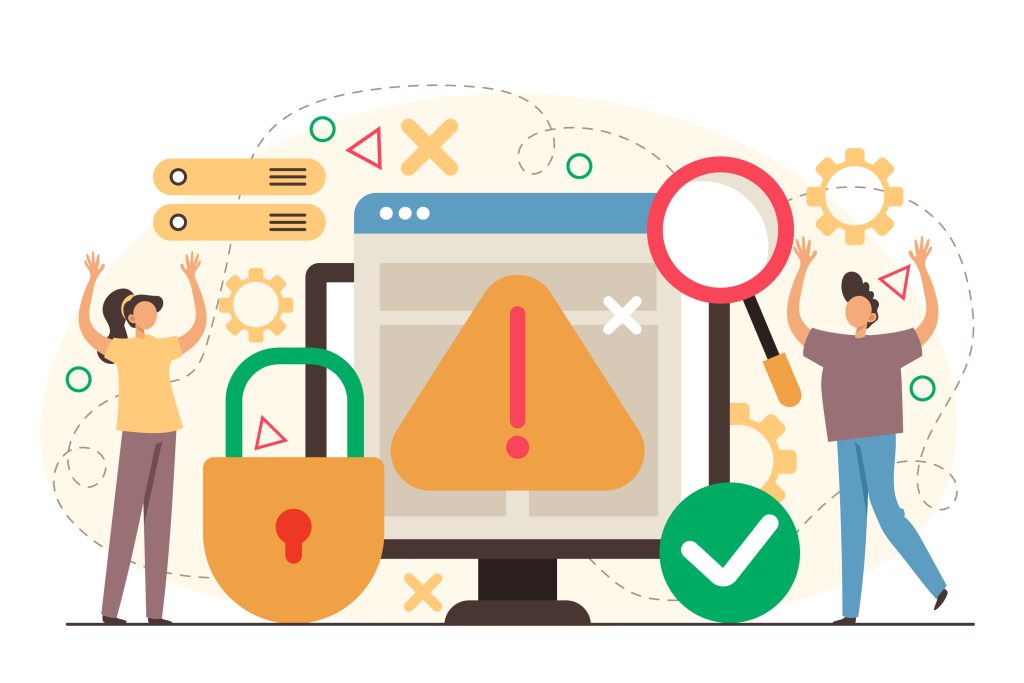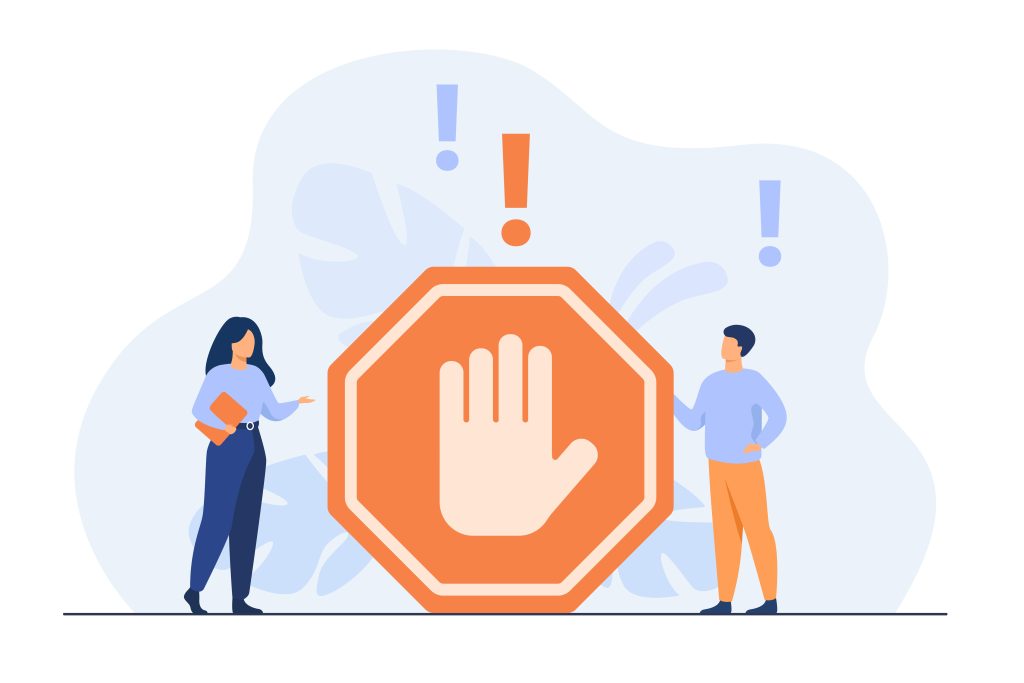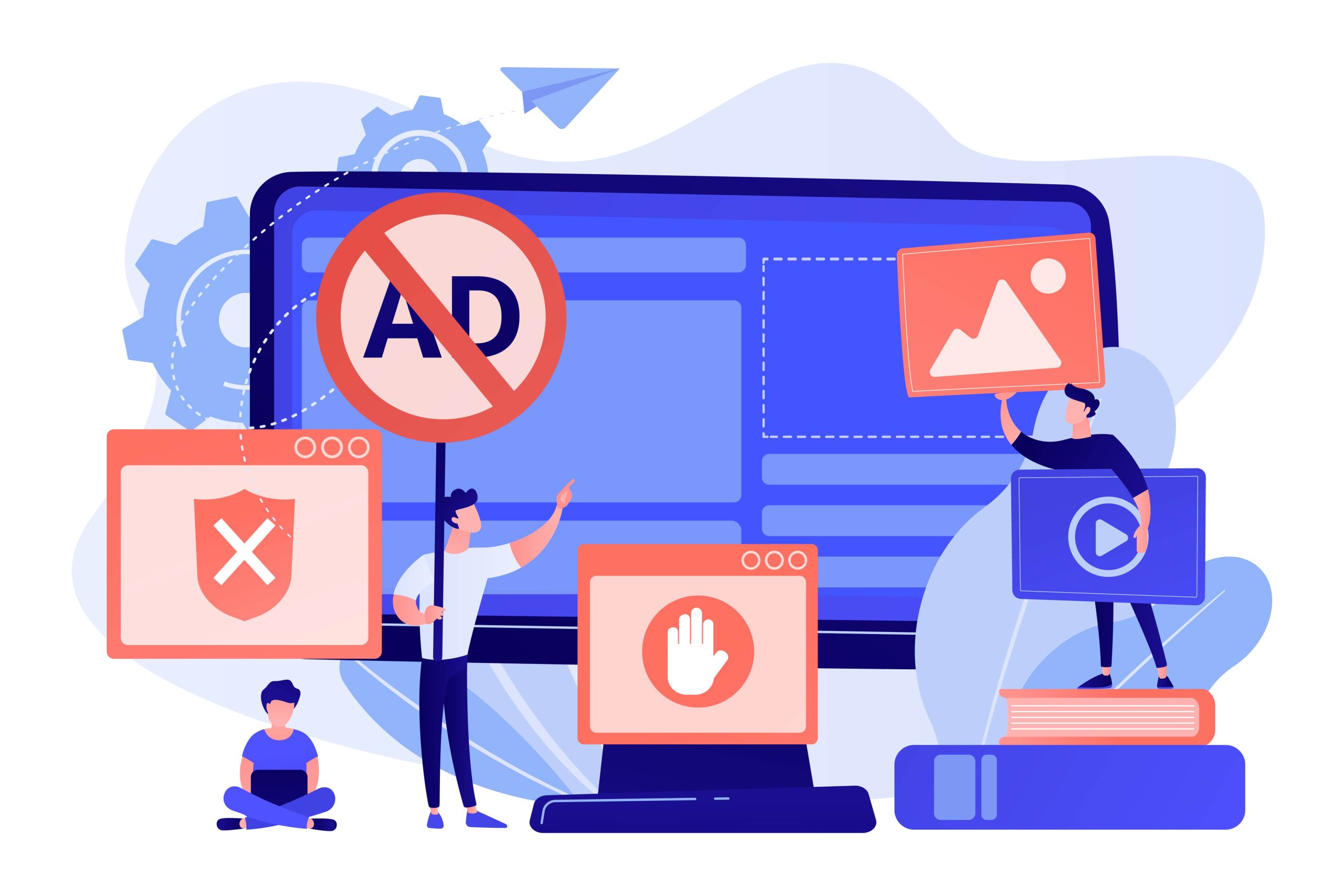From pop-ups to banner ads, the online advertising world can be overwhelming, intrusive, and sometimes even risky. This is where adblockers come into play. Adblockers are software tools, usually in the form of browser extensions or standalone applications, designed to filter out and prevent ads from being displayed on web pages. They offer users a more streamlined, distraction-free browsing experience. But the use of adblockers extends beyond just avoiding annoyance; it touches on broader issues such as privacy, web economics, and the ethical considerations of accessing free content.
What Does Mean By Adblocker?

Adblockers are like digital gatekeepers for your web browsing experience. They’re tools you can add to your web browser, or sometimes they come as separate apps or built-in features in the browser itself. Their main job? To stop ads from showing up on the websites you visit.
Imagine you’re reading an article or watching a video online – adblockers help keep that experience clean and uninterrupted by blocking those pesky ads from popping up.
They’re not just about keeping things tidy, though; they also help your pages load faster, save your data, and protect your privacy by keeping those sneaky trackers that follow your online activity at bay. So, in a nutshell, adblockers make your online journey smoother, safer, and more enjoyable.
Benefits of Using Adblocker

1. Reduced Risk of ‘Ad Fatigue’
Ad fatigue is a real phenomenon where constant ad exposure leads to a sort of numbness towards marketing messages. It’s like hearing the same song on repeat until it loses its charm. In a digital world saturated with ads, users often find themselves disengaged, no longer paying attention to what’s being advertised. By filtering out the relentless stream of ads, they help maintain the freshness and impact of marketing messages when users do encounter them. This not only improves the user experience but also ensures that when ads are viewed, they’re more likely to be effective and less likely to be ignored.
2. Aid in Research and Education
Adblockers clear away the digital clutter, allowing students and researchers to focus on the information that matters. This focused environment is conducive to better learning, understanding, and retention of information. In academic settings, where concentration and efficient use of resources are key, adblockers can significantly enhance the effectiveness of online study and research tools.
3. Beneficial for Limited Hardware
These devices, which might struggle with modern, ad-heavy websites, get a performance boost from adblockers. By preventing ads from loading, adblockers reduce the processing burden on these devices, allowing for smoother operation and quicker page loading. This can extend the usable life of older hardware, delaying the need for costly upgrades and making the digital world more accessible to those with limited technology.
4. Support for Content Filtering
Adblockers offer more than just blocking ads; they allow for personalization of the browsing experience. Think of it as having a customizable filter for your online water – you decide what gets through and what doesn’t. Users can configure adblockers to block specific types of content, not just ads. This means if there are certain imagery, topics, or types of media you want to avoid, adblockers can help. This customization makes the internet a more personal and comfortable space, tailored to individual preferences and sensibilities.
5. Contribution to a Less Consumerist Culture
By reducing the constant bombardment of advertising, they help create a space where consumerism isn’t the dominant narrative. This can encourage a mindset less focused on acquiring the latest products and more on meaningful experiences or mindful consumption. It’s a step towards a culture where value isn’t just measured in terms of possessions or purchases but in richer, more diverse experiences and ideas.
6. Reduction in Overhead Costs
Adblockers significantly reduce the strain on your device’s resources. When you visit a website, it’s not just the main content that loads; numerous ads also load in the background. These ads consume processing power and memory, which can slow down your device, especially if it’s an older model or has limited resources. By blocking these ads, adblockers lighten the load on your device, making everything from web browsing to running other applications smoother and more efficient. This is particularly noticeable on websites heavy with ads, where the difference in performance with an ad blocker can be like night and day.
7. Less Intrusive Browsing
Intrusive ads, such as pop-ups that cover the content you’re trying to read or videos that start playing automatically with sound, disrupt your online activities and can be intensely frustrating. Adblockers eliminate these interruptions, allowing for a more serene and focused online experience. This means you can read articles, watch videos, and browse websites without constantly being bombarded by these digital interruptions.
8. Improved Mental Well-being
Adblockers serve as a shield against this barrage of ads, many of which are designed to manipulate emotions or exploit insecurities, such as those promoting weight loss products or luxury lifestyles. By limiting exposure to such content, adblockers contribute to a healthier, more realistic online environment, helping to mitigate feelings of inadequacy or desire triggered by these ads. This can lead to improved mental well-being, fostering a healthier relationship with digital content.
9. Protection Against Misleading Ads
The internet is rife with ads that range from slightly misleading to outright scams. These ads often promise unrealistic results or sell products of dubious quality. They can lead to bad purchases, financial loss, or worse, compromise personal information. Adblockers act as a first line of defense against these deceptive advertisements. By blocking them from appearing, they significantly reduce the chances of encountering such harmful content. This protection is particularly valuable in an era where digital scamming techniques are becoming increasingly sophisticated.
10. Enhanced Child Safety
For younger internet users, the online world can be a place full of inappropriate content, some of which is found in advertisements. Ads for adult products, services, or content, can appear on otherwise kid-friendly websites. Adblockers create a safer online environment for children by blocking these types of ads. This helps to ensure that kids’ online experiences are more appropriate and less likely to expose them to content that they’re not mature enough to understand or that could be harmful to their development. For parents, this provides peace of mind and a valuable tool in managing their children’s digital experience.
11. Battery Life Extension
Using adblockers on mobile devices is like giving your phone a power-saving mode specifically for your internet browsing. Ads, especially those that are animated or video-based, consume more processing power, which in turn drains the battery faster. Adblockers alleviate this by blocking these energy-intensive ads, thus reducing the overall power consumption when you’re browsing. This leads to a noticeable extension in battery life, allowing you to use your device for longer periods without needing a recharge. It’s particularly beneficial when you’re on the go and need to conserve battery life for essential tasks.
12. Avoidance of Distractions
Ads, by their very nature, are designed to capture attention, and they can be incredibly distracting, particularly when you’re trying to focus on reading or watching content online. Adblockers clear away these visual and auditory distractions, enabling you to concentrate fully on the task at hand. This is especially valuable for activities that require deep focus, such as studying, reading in-depth articles, or enjoying a favorite show or movie without interruptions.
13. Customization
Adblockers are not just about blocking all ads; they offer a palette for personalizing your internet experience. Many adblockers provide customization options, allowing you to choose which websites to support by whitelisting them or selecting specific types of ads that you don’t mind seeing. This feature respects your preferences and the business models of websites you appreciate, creating a balanced online ecosystem tailored to your values and interests. It’s like setting rules for guests in your digital house – you decide who gets in and who doesn’t.
14. Improved Accessibility
For individuals with cognitive or visual impairments, the web can often feel like an obstacle course filled with ads. These ads can be more than just annoyances; they can create genuine barriers to accessing content. Adblockers remove these barriers, simplifying web pages and making them more navigable. By reducing visual clutter and eliminating flashing or moving ads that can be disorienting or distracting, adblockers make the internet more inclusive and accessible. This improvement is a significant step towards ensuring that the web is a space for everyone, regardless of their abilities.
15. User Empowerment
Adblockers hand the reins of the online experience back to the user. by advertiser interests, adblockers empower you to take control over what you see and interact with on the internet. This control is more than just a convenience; it’s a statement of autonomy and choice in an environment where these can often feel limited. Whether it’s blocking intrusive ads, protecting personal data, or simply decluttering the digital space, adblockers put you in the driver’s seat of your digital journey, allowing you to shape your online world according to your preferences and needs.
16. Enhanced Browsing Experience
The use of adblockers transforms your browsing experience into a serene digital journey, akin to reading a book without any footnotes or sidebars to distract you. Websites are often cluttered with ads that can detract from the content you’re interested in. Adblockers streamline this experience by removing these distractions, presenting a cleaner and more focused interface. This not only makes browsing more enjoyable but also easier to navigate, as the relevant content takes center stage without being overshadowed by flashy ads or pop-ups.
17. Faster Page Loading
Ads, especially those that are media-rich, can significantly slow down the loading time of web pages as they consume a substantial amount of bandwidth. By blocking these ads, adblockers facilitate a swifter browsing experience, where pages load faster, making your online activities more efficient. This is particularly beneficial when accessing content-heavy websites where ads can notably bog down performance.
18. Data Privacy Protection
Many ads come equipped with trackers that monitor your browsing habits, preferences, and even personal details. This data is often collected and used for targeted advertising or could potentially be accessed by malicious entities. Adblockers prevent these trackers from loading, thereby safeguarding your online activities from prying eyes. This enhanced privacy protection is a substantial benefit in maintaining control over your data on the internet.
19. Security
Some ads harbor malicious software, such as malware or spyware, which can harm your device, compromise your data, or lead to identity theft. Adblockers serve as a crucial defense mechanism, filtering out these potentially harmful ads. This reduces the risk of unintentionally downloading malicious content, offering a safer browsing environment.
20. Reduced Bandwidth Usage
Ads, particularly those with video or high-quality images, consume a significant portion of data. By blocking these ads, adblockers help in reducing the amount of data that is used when browsing the internet. This is especially beneficial for users who rely on mobile data or have restricted bandwidth allowances, as it helps in managing data usage more effectively, avoiding overage charges, and ensuring that data is spent on content that truly matters to them.
Cons of Using Adblocker

1. Impact on Small Businesses and Bloggers
When ad blockers are used, the revenue stream from displayed ads gets severely reduced, potentially threatening their financial viability. This can lead to smaller websites struggling to survive or being unable to provide quality content, which in turn diminishes the diversity and richness of content available on the web. For these small-scale content creators, ad blockers represent a significant challenge to their ability to share their work and earn a livelihood.
2. Complications in Online Shopping
Adblockers can sometimes interfere with the online shopping experience in unexpected ways. Many e-commerce websites use ads or affiliate links to offer special deals, discounts, or product recommendations. Adblockers might inadvertently block these beneficial elements, potentially causing shoppers to miss out on savings or interesting products. This not only affects the consumer, who might pay more or not discover useful products but also impacts the revenue of e-commerce sites that rely on affiliate marketing. The irony is that adblockers, while intended to streamline and improve the browsing experience, can sometimes result in a less advantageous shopping experience.
3. Potential Legal Issues
Some content providers argue that ad blocking circumvents the economic model of free content in exchange for ad exposure, potentially leading to legal challenges. The debate often centers around the rights of users to control their browsing experience versus the rights of content providers to monetize their offerings. As laws and regulations struggle to keep pace with rapidly evolving digital technologies, users of adblockers may find themselves in a complex legal landscape with varying interpretations and enforcement.
4. Reduced Cultural and Product Awareness
Through ads, consumers are introduced to new products, services, and even cultural events they might not have discovered otherwise. By blocking ads, users may inadvertently isolate themselves from new and potentially beneficial or enriching information. This reduced exposure can limit the awareness and understanding of evolving market trends, innovative products, and cultural developments, potentially leading to a narrower field of consumer knowledge and experience.
5. Adaptation by Advertisers
In response to the widespread use of adblockers, advertisers may resort to more aggressive or covert methods of advertising. These tactics might include embedding ads more deeply within content, making them harder to distinguish and block, or using alternative forms of marketing that are not affected by adblockers, such as sponsored content or influencer marketing. Some of these methods can be more intrusive and less transparent than traditional ads, potentially leading to a more disrupted and less trustworthy online experience. This cat-and-mouse game between adblockers and advertisers can lead to a continuous escalation of tactics, complicating the user experience further.
6. Hindrance to Market Research
When adblockers are used, the collection of this data is significantly hindered. This lack of insight can slow down the innovation and improvement of products and services, as businesses lose a key source of feedback. Consequently, consumers might find that the market is slower to respond to their evolving needs and preferences, leading to a less dynamic and responsive business environment.
7. Risk of Supporting Unethical Adblocker Providers
Some adblocker providers have been implicated in practices like selling user data or allowing certain ads to bypass their filters for a fee. This not only undermines the primary purpose of using an adblocker but also puts user privacy at risk. Users need to be vigilant and conduct thorough research before choosing an adblocker, ensuring they are not inadvertently supporting a provider that engages in these unethical practices.
8. Reduced Feedback Loop for Websites
When adblockers are used, this feedback loop is disrupted, as metrics like ad impressions and click-through rates are skewed. This can lead to less informed decisions about content creation and website design, potentially diminishing the overall quality and relevance of the content provided to users.
9. Dependency on Adblocker Updates
Advertisers continuously develop new methods to deliver ads, and adblockers must be regularly updated to counter these techniques. If an adblocker is not kept up to date, it may become less effective, allowing ads to slip through or, conversely, blocking non-ad content. This dependence on updates requires users to be proactive in maintaining their adblocker software, adding an element of ongoing management to their digital experience.
10. Conflict with Corporate Policies
In a corporate setting, the use of adblockers can sometimes clash with IT policies or operational guidelines. Many organizations have specific rules regarding the installation of software on company devices to ensure security and compliance with various standards. Adblockers, especially those not vetted by the organization, might conflict with these policies. Additionally, some companies rely on advertising as part of their business operations or market research, and using adblockers could interfere with these activities. Employees using adblockers may need to navigate these conflicts, balancing their personal preferences with corporate requirements.
11. Impact on Free Content
Many websites and content creators rely on ad revenue as their primary, sometimes only, source of income. When ads are blocked, this revenue stream is significantly diminished. This can lead to a reduction in the quality and quantity of free content available, as creators and website owners may not have the necessary funds to maintain or improve their offerings. In some cases, this financial strain could even lead to the disappearance of popular websites or services, shrinking the diversity and richness of content available on the internet at no cost.
12. Website Functionality Issues
Some sites are designed with ad integrations that are crucial to their layout or navigation. When adblockers remove these elements, it can disrupt the site’s intended design, leading to broken pages, missing content, or even complete inaccessibility of certain features. This not only detracts from the user experience but also poses challenges for website owners who must ensure their sites function correctly for all users, regardless of whether they use adblockers.
13. Over Blocking
Adblockers, in their zeal to shield users from unwanted ads, can sometimes be overzealous, blocking content that isn’t advertising. This can include important site features, informative graphics, or even essential navigation elements. The result is a web experience that’s less rich and informative than intended, potentially leading users to miss out on valuable content. This overzealous filtering can be particularly problematic on websites where ads are subtly integrated with content, making it challenging for adblockers to distinguish between the two.
14. Maintenance and Reliability
As advertisers continually evolve their techniques to bypass adblocking software, adblockers must be regularly updated to keep up with these new strategies. If not updated, they can become less effective, allowing ads to slip through and defeat their purpose. This maintenance aspect means users need to be proactive in ensuring their adblocker is up-to-date, which can be an additional task in the ever-growing list of digital housekeeping duties. Outdated adblockers might not only fail to block new ad formats but also potentially cause issues with website functionality.
15. Limited Effectiveness Against Native Ads
Native ads, which are designed to blend seamlessly with the content of a website, pose a significant challenge to adblockers. These ads mimic the look, feel, and format of the site they’re on, making them difficult to distinguish from genuine content. As a result, many adblockers struggle to identify and block these types of ads without also affecting similar non-ad content. This limitation reduces the overall effectiveness of adblockers in providing a completely ad-free browsing experience and can be particularly frustrating for users who wish to avoid all forms of advertising.
16. Potential for Data Collection
some adblockers, designed to protect user privacy from advertisers, may themselves engage in data collection practices. These adblockers might track users’ browsing habits, collect data about visited websites or even share information with third parties. This practice can compromise the privacy and security that users seek when installing an adblocker. It underscores the importance of carefully choosing an adblocker provider and scrutinizing their privacy policy to ensure your online habits aren’t being monitored or shared under the guise of ad-blocking.
17. Conflict with Website Requests
Many websites detect the use of adblockers and respond by requesting or in some cases, demanding that users disable them to access content. This puts privacy-conscious users in a difficult position: comply and expose themselves to ads (and potential tracking) or lose access to the content. This dilemma can be particularly acute on websites offering essential information or services. Users must balance their desire for an ad-free experience with the need or desire to access certain online content, sometimes leading to the reluctant disabling of their adblocking tools.
18. Dependency on Adblocker Providers
When using adblockers, users place a significant amount of trust in the providers of these tools. They rely on them not only to effectively block unwanted content but also to respect their privacy and security. However, not all adblocker providers may have the user’s best interests at heart. Some may engage in practices like allowing certain ads for a fee (the so-called “acceptable ads” programs) or collecting user data. This dependency means users must be discerning in choosing a reputable adblocker provider, understanding that their online experience and privacy are in the hands of a third party.
Conclusion
Adblockers represent a significant development in the way we experience the internet. They empower users with control over their browsing experience, offering relief from incessant advertisements, enhancing privacy, and improving the overall efficiency of web navigation. the impact of adblockers is a double-edged sword. While they provide undeniable benefits to the user, they also pose challenges to the economic models of online content creation and distribution. The use of adblockers sparks a complex debate about the sustainability of free content in an ad-supported web environment and raises ethical questions regarding consumer responsibility.
































































